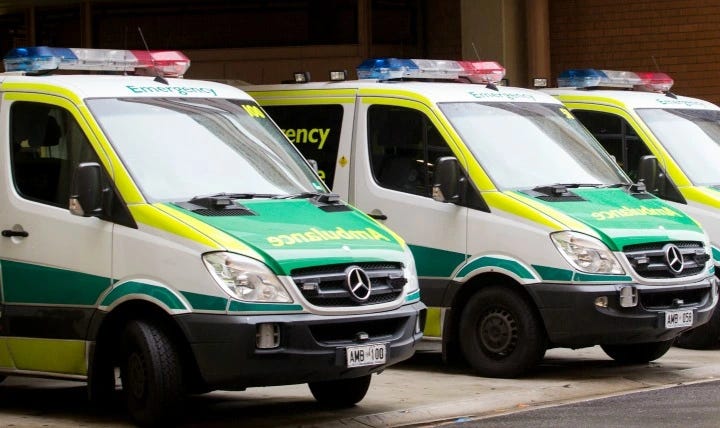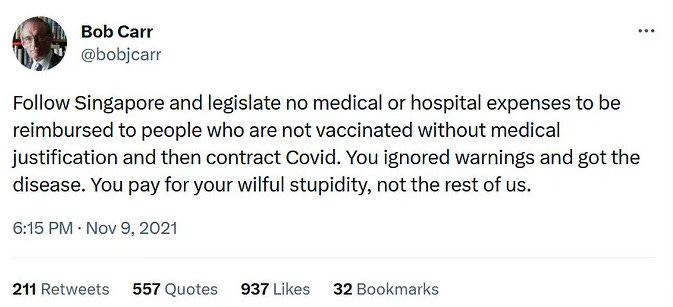Most Australians are proud of our public healthcare system. It faces virtually no opposition and any effort to shrink it is political suicide. Labor still runs scare campaigns claiming the Liberals plan to “scrap Medicare”, yet the Liberal Party would never even dream of it.
On face value, our public healthcare system does seem impressive: necessities are covered, you don’t need to be worried about a scary bill after a hospital visit, and you can be assured that life-saving care is always available.
But look below the surface and you will find many problems. Ambulance ramping is widespread across Australia. The cost of public healthcare is sending our country broke. And there is one issue that is never talked about: the weaponisation of public health.

THE WEAPONISATION OF PUBLIC HEALTH
Many saw this for the first time during COVID: the loyal foot-soldiers of public health were demanding that unvaccinated individuals should not have access to public healthcare. Those who failed to look after themselves should be given the lowest priority when they inevitably end up in the healthcare system due to COVID, or so proponents of vaccine mandates claimed. They were wrong, but they also promoted a dangerous idea: that public health should not be equally provided for everyone.

For those of us who have been following the erosion of our liberties under the guise of ‘public health’ for decades, we have seen this all play-out before. Smokers have been the canary in the coal mine. For decades, a public health war has been waged against smokers: endlessly raising taxes and pushing smokers further away from social settings. All of this has been justified by claiming that smokers are a burden on public health.
Forget the fact that tobacco tax covers the cost of smoking on the public purse over ten times and assume anti-smoking activists are correct. The fundamental basis of public health is that those who are generally healthy pay for the costs of those who generally are not, whether due to lifestyle choices or otherwise.
If we can justify taxing and ostracising smokers due to their over-representation in public hospitals, who else can we justify doing that too? Obese people? Motorcyclists? Consumers of alcohol? What about basing it on the suburb where you live? It is not hard to find out who lives in more unhealthy suburbs and extrapolate that to greater reliance on public health. Should we tax and ostracise them too? The revenue-raising and divisive possibilities are endless.

A WAR ON ALL FRONTS
Under the Rudd and Gillard Governments, we saw the cultural war machine push hard against smokers. Health Minister Nicola Roxon brought her own personal vendetta against smokers to her position. Roxon implemented annual tobacco tax increases, resulting in the price of a pack of cigarettes more than quadrupling from 2010 to 2020, and her pièce de rèsistance: plain packaging. Neither of these measures reduced the prevalence of smoking in Australia, but they disproportionately hurt low-income earners (the typical demographic of smokers) and fed a booming illicit tobacco market.
It seems the new Health Minister, Mark Butler, has picked up where Roxon left off – with a five per cent tobacco tax increase per year for four years. If we learnt anything from last time it will almost certainly go on longer than four years. On top of that there is a new war on vaping, a product 95 per cent safer than cigarettes.
As if the federal war on smoking was not enough, in South Australia, the Malinauskas Government wages its own, as do various local governments. Relegating smokers to outdoors is not enough – the SA Government wants to push smokers away from outdoor public settings. They also hope to prohibit cigarette vending machines, hurting an already struggling hospitality industry.
The boot will continue to press on our faces until there is nothing left.
WAKE UP AND SMELL THE TOBACCO SMOKE
This is not just about smoking. Smokers are the guinea pigs: fewer than one in seven Australian adults smoke and most already feel like junkies. Smokers are easy targets: taxes are increased and restrictions become more onerous with little public outcry.
Non-smokers should not only watch with concern but act! As Neil Gaiman said …
“If you don’t stand up for the stuff you don’t like,
when they come for the stuff you do like,
you’ve already lost.”
More than anything, this should serve as a warning of the dangers of socialised healthcare: it is a weapon ready to be fired at the latest dissident group. There is no such thing as a free lunch and the cost of this lunch not only threatens Australia’s back pocket. It threatens our individual liberties and, ultimately, our identity.


